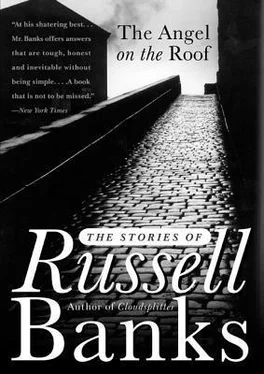When at last he rounded the corner at the end of the street and disappeared, I flagged the barman and asked for my check.
“You don’t want your second Rhino, sir?” he asked. “And then to eat dinner, same as every night? We got a special native meat ’n’ vegetable pie tonight, sir, something English peoples like more’n anybody else.” He feared he was losing a regular customer. He assured me that Djinn was just a harmless madman and rarely came here this time of day anyhow and would probably not come tomorrow or any other day for as long as I stayed in Gbandeh. He, Andrew, would guarantee it personally.
I said no, the madman hadn’t bothered me. I had a difficult week, I explained, and was rather tired and would be eating in my hotel this evening. “Don’t worry, friend,” I said to him. “I’ll be back again.”
The truth is, for the remainder of my stay in Gbandeh, I did not return to that café. Nor to any other. Nor did I take my daily stroll around the square. Instead, I kept to myself and took my meals in my room or in the hotel dining room and drank my Rhinos at the hotel bar, where the only other patrons were a half dozen European tourists and four or five American and Asian businesspeople. I made friends with none of them. Also, my contacts with Africans from then on were pretty much limited to my driver and our employees out at the assembly plant, people whose private lives I pointedly did not try to imagine. Even the Gbandehans I passed in the street now seemed faceless and nearly invisible to me. I checked daily at the hotel desk for the call from the home office to return to New Jersey, until finally, at the end of my fourth week in Gbandeh, it arrived. The next morning, I fled the country.
In April of the following year, nearly fifteen months after my anxious departure from Katonga, I returned, sent over this time to open and bring into full production a second assembly plant at the Gbandeh Industrial Park. The Dutch consortium that owned our company had recently purchased from a bank in Frankfurt a failed Japanese furniture maker’s defaulted mortgage on one of the two buildings out there by ours on the eroded red plain. Of all our American employees, I was thought to be the most capable of dealing efficiently with the Africans and thus had recently been promoted to manager of foreign operations. My assignment this time was to purchase the machinery and hire and train the workers so that by summer the second plant would be running smoothly alongside the first. This would double our sandal production and bring it into line with our projected sales figures for the upcoming fall and winter.
It was near the end of the rainy season, and while the air had been cleared of the ubiquitous red dust of my previous visit, now the ground, streets, alleys, and courtyards, even the floors of locked interiors, were carpeted with thick, red mud. Other people, entering the room after you had departed, picked up your mud on their shoes, clothing, and hands and carried it to new places. Cars, donkey carts, bicyclists, and pedestrians splashed it over your shoes and trousers, and you carried the mud from the streets onto tiles, rugs, and polished mahogany floors, accidentally rubbing it against drapes, chairs, and sofas. If you touched your face or hair or your clean white shirt, you left behind a red stain resembling an unhealed wound.
This weather and its unpleasant consequences were sufficiently different from those of my previous tour that Katonga seemed an altogether different country from the one I had left fifteen months earlier. In addition, I had pretty much forgotten by then my unsettling encounter with the madman, Djinn, and the subtly alienating shifts in attitude and consciousness that I underwent afterwards. I remembered only my early enthusiasm for the place and the people, my first impressions, as it were, and my still unsatisfied curiosity about their lives, along with the self-examination occasioned by my passing irritation with one or another of their, to me, incomprehensible native ways. I remembered, in other words, having been a good traveler, little else.
Then one evening a few weeks into my stay, at last the rain let up for a few hours, signaling the approach of the close of the rainy season, and for the first time I went out from my hotel without an umbrella and, as in the old days, circumambulated Binga Park. Inadvertently, at the end of my walk, I found myself at the same cul-de-sac close by the hotel and strolled into the café at the end of it, the place where I had met the madman. The barman, Andrew, was still there and remembered me at once and, surprisingly, was even able to hail me by name and, without my asking, brought me an opened bottle of Rhino beer, nicely chilled.
“You arrive in Katonga at the perfect time, sir!” he said in a loud voice. “The rain is over, and the heat not yet begun. That’s the reason we call this time the season of in-between! The whole city, sir, the entire country, gets washed clean like a newborn baby! We get rid of the mud and get ready for the dust,” he proudly declared, as if announcing an elaborate rite of spring practiced only here in Katonga. “Will you be ordering your dinner with us, sir? We got excellent grilled fish. Fresh-netted fish floated by the rains down to us from the mountains.”
The café was filling with newcomers, local folks who, like me, were out for the evening to socialize for the first time in weeks. I decided to stay awhile, to order dinner and watch the natives take their pleasure. The idea of eating a scavenged fish rain-washed from a stream onto the muddy floodplain did not especially appeal to me, however, so I asked Andrew if he still offered the meat and vegetable pie that the English were said to be so fond of.
He was very happy to say that, yes, indeed, he had that pie ready to be placed into the oven this very minute, a pie for me and me alone, he said, made with all the native vegetables and various meats from the countryside. Which included chimpanzee, I assumed, but, on reflection, decided not to verify one way or the other and hoped instead for wild pig, or at least something with a texture and taste that would let me pretend I was eating wild pig.
I had finished my second Rhino and was about to order a third, when the waitress delivered my pie, steaming hot and smelling for all the world like a delicious roasted pork loin. I asked for a glass of South African red wine, usually quite reliable, and proceeded to eat. It was pig, I was sure of it. And yams, groundnuts, bitter greens of some sort, peppers, and onions. And the wine was more than adequate. Very good, I signaled to Andrew, and he smiled broadly.
The café was nearly filled by now with neighborhood men and women of various ages, most of them in groups of four or five, happily drinking and intensely exchanging political news and sexual gossip — the two were often the same here. The women flirted with the men, who competed with one another for the attention of the women: all the old erotic and social moves of the species on display again, now that the rain had ceased. My attention wandered from one table to the next, finding some more amusing and interesting than others, conducting the sort of private, anthropological research that had always engaged me, regardless of where I found myself, even at home, in Hopewell, New Jersey.
Then, from the corner of my eye, I noticed off to my right a figure turn into the cul-de-sac from the square, a large, dark person hunched over in a familiar way and lurching erratically from side to side as he made his way down the narrow street toward the café. It was Djinn, and instantly the same fascination and fear I’d experienced before fell across my shoulders like a heavy woolen cloak. No one else in the café seemed to notice him; everyone continued to talk, drink, and eat normally. I, however, at once put my fork down and stared at the man. He looked about the same as he had the first time — large and muscular, nearly naked, with long, matted locks and beard. But now he was covered with caked red mud, instead of dust. It was a coating rather than a skin, as if he’d been basted with it over a fire, and it made his body seem somehow more fierce than it had before, more potentially violent. He wore on his face the same strange expression of near-ecstatic clarity of feeling as before, an almost transcendent look, one we associate with the god-intoxicated.
Читать дальше












